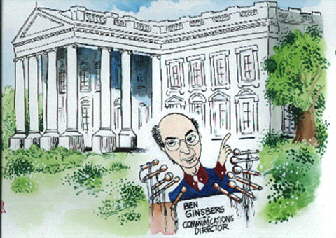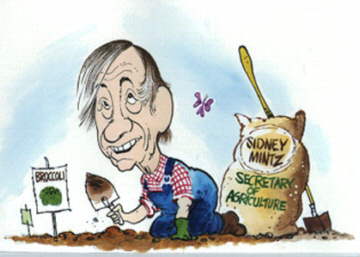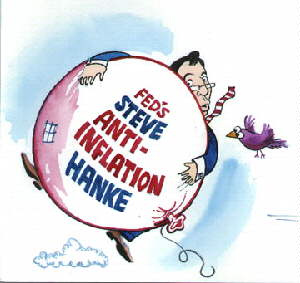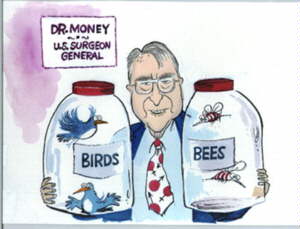
It is not implausible. Bernadine Healy, a former cardiologist at Hopkins Hospital, became director of the National Institutes of Health, for example. David Kessler, who did his residency at Johns Hopkins Hospital, is now director of the Food and Drug Administration. There have been others. While they were at Hopkins, surely colleagues predicted their future migration to Washington.
But we weren't interested in the predictable. Instead, we set out to find people with a special interest, axe to grind, or unconventional perspective that, with a big stretch of the imagination, could be their ticket to public office.
With the help of our dog-eared Johns Hopkins Experts, a slightly outdated guide to Hopkins's Big Thinkers, we took the liberty of selecting various cabinet chiefs, agency directors, and assorted image makers from across the political spectrum for the next President, whoever he or she may be.
We consulted each appointee and asked, what would a day in the life of this administration be like? Here's the scenario.

[From a page-one article that appeared in the July 1, 1997, Detroit Free Press]
Secretary of Transportation Stuart W. Leslie bicycled to work yesterday, trailed by a puffing retinue of reporters, photographers, and residents who had received free bicycles and bicycling shorts. Arriving at the Transportation building, the cyclists were greeted by a big brass band and a row of portable showers.
"I bicycle to work every day," Leslie told reporters. "The automobile has no place in the center city." The secretary announced that starting tomorrow, free public bicycles will be made available to commuters in 10 major cities including Detroit.
The gala event, sponsored by the Department of Transportation and Lycra USA, kicked off an initiative by the department to reduce the number of cars on the nation's roads.
"We're addicted to our automobiles," said Leslie. "We've shaped our policies around the auto, instead of setting policies and then making the auto work within those policies."
His predecessors in federal and state government, said Leslie, subsidized automobile and trucking transportation by funding construction of highways and expressways. New roads encouraged developers to build houses and businesses farther and farther away from city centers, which, in turn, induced cities and suburbs to sprawl like fungus.
Leslie's initiative calls for a halt to federal subsidies for the construction of new roads and for increased support for research on and development of alternatives to automobile transport. Leslie said he will press for cleaner sources of energy, such as new alcohol-based fuels and photoelectric cells.
However, Leslie will not set a zero-emissions policy, a goal that could only be achieved through dramatically increasing the number of electric automobiles. While electric cars do not produce emissions, they require large amounts of electricity, which would have to come from environmentally destructive coal-fired plants, said the secretary.
Leslie said he will also support the construction of more light-rail systems, which are cheaper than heavy rail mass transit, and will push for more goods to be transported by freight-rail rather than by truck.
To further discourage automobile use, Leslie will increase the tax on gasoline, which will raise the price of gas to rates found in Japan and Germany. The secretary said he will funnel the tax money into research on alternative fuels. He will also advocate barring cars from many urban streets, to make room for bicycle commuters.

Benjamin
Ginsberg
Credentials: David
Bernstein Professor of Political
Science. Quotable and sardonic.
White House Communications Director
[Excerpted from Kiss and Tell All (Mercenary Press, 1997), by Benjamin Ginsberg]
Seven Pointers for the President:
1. Deny, deny, deny. Deny everything. But deny in a way that is deniable. So if you are caught in a lie, you can deny it, and then deny that you denied it. Claim that when all the facts come out, it will seem like there was no wrongdoing at all.
2. Try to remain above the battle. Never become involved in the stream of claims. The facts can always be blamed on the staff. Then you can be shocked when the facts are publicized.
3. Always come as close to the truth as possible. Reveal everything with nothing. Remember Nixon's "limited hang-out."
4. Always be kingly. Associate yourself with important national events--weddings, funerals, bar mitzvahs. In the event of tragedy, speak movingly, but without content.
5. The Rule of Reagan: Avoid numbers. Remember, Reagan got them wrong. Appear to give the facts, but always use general or comparative terms: "many," "few," "less," "more." Say your wife made some money in the commodities trade.
6. However, never put your wife in a position of authority. You can't fire your wife. The purpose of the staff is to take the axe in times of scandal.
7. Always brownnose the media. Throw parties. Ask their advice. Don't do anything to offend them.

[Excerpted from a speech made by Secretary Mintz alongside the Baltimore beltway at the groundbreaking for a new urban garden, July 1, 1997.]
"We cannot discuss farm policy without noticing that our population is increasing, and we are using up water and land, especially for non-agricultural and non-recreational purposes. In 50 years, our population, currently 250 million, will double. Available farmland will be halved, most going for roads, shopping malls, and houses. Water resources will diminish significantly. There will be few swimming pools, no more unmetered water.
"As a consequence, we'll see enormous increases in the price of food. We now pay about 15 percent of our income for food. Experts predict that percentage will double, or even triple, reaching rates comparable to those in much of Europe, where people may spend 50 percent of their paychecks on food.
"We begin now to work toward creating a sustainable agriculture-- one that consumes less fossil fuel and less water reserves. To do that, we need to relocalize farming. That means increasing the number of people involved in growing food, rather than decreasing that number, as has been the trend.
"Currently, our food is farmed by a disproportionately small fraction of our labor force. Most Americans are eating food they had no part in producing. They have no knowledge of the costs or pleasures of producing it. When our food comes from far away, it is easy to ignore the costs and consequences of farming. We can tell ourselves, 'It's not my problem.'
"There must be a national effort to reward local agriculture projects, especially around cities. Thus, I am pressing for legislation that will subsidize a national system of urban gardens. We will provide garden plots to urban residents in the 'greenbelts' surrounding our major cities, starting today with Baltimore. This system, modeled on the victory gardens of London during World War II, will be called 'Broccoli Around the Beltway.' Where today you see weeds, tomorrow a vegetable garden will bloom."

[From the July 1, 1997, Wall Street Journal]
In testimony before the Senate Banking Committee yesterday, Federal Reserve Board chairman Steve Hanke announced that the Fed is seeking greater independence to free itself from politics.
If the plan is adopted, which will probably require amending the Federal Reserve Act, Hanke noted, the Fed will become a supplier under contract to the government. "The Fed will be equivalent to any other supplier of tires, furniture, or other goods," said Hanke. "We will have a contract with the government, just like a furniture contractor has a contract."
Under its contract, the Fed will be required to meet only one objective: to keep inflation between zero and 2 percent per year. "If the Fed fails to meet this one specification, I, as chairman, will automatically get a pink slip," affirmed Hanke. "The Fed will get a new chairman and new board members."
With the enactment of the Employment Act of 1946, the Fed "became committed to promoting high employment consistent with stable prices," noted Hanke. The new plan will whittle the Fed's duties back down to one responsibility--keeping inflation down.
"This change will allow us to employ any means to pursue the inflation target without political interference," the chairman said. "The Fed has been manipulated and put under political pressure to keep interest rates low, particularly in the months prior to presidential elections."
Senate Banking members immediately besieged Hanke with questions about such a dramatic change in the nation's central bank. Hanke responded that New Zealand introduced a similar idea in December 1989, and has kept inflation to within the zero-to-2 percent target for the past five years. "The immediate thing I'm concerned about is eliminating inflation," he added.

Minutes of the Madison Avenue Corporate Executive Group Power Breakfast, July 1, 1997
In attendance: Adam Smith, Free Market Ads; Muffy Subliminal, The YubYub Group; Frank Purchase, Ads 'R Us; and Roland Fatcat, of Fatcat, Greenback, and Dough.
Meeting convened at 7:35 a.m. Adam Smith announced the key speaker, Secretary of Health and Human Services Giulia Sissa. Smith said the secretary would like to enlist Madison Avenue in creating advertisements aimed at pitching virtue.
Sissa then spoke. She said the nation's current politics of virtue stresses the renunciation of pleasure--saying no to drugs, embracing chastity. That message is ineffective.
Sissa explained that ancient philosophers described two forms of pleasure. The first is an immediate bodily sensation of delight, which can come from a good meal, for example, or sex. The second, virtue, is less acute, but ultimately longer lasting and more sublime. It involves seeking a way to continue doing what you are enjoying. Philosophy is all about how to trade the first type of pleasure for the second.
Sissa suggested developing ad concepts that sell virtue in a positive way. She said: "You should sell virtue as a better pleasure. Explain that it is of better quality and longer duration, that time is pleasure. Glamorize it."
The secretary then presented a series of advertising strategies:
1. For ads targeting heroin addicts, use the principle of comparative advertising. Make the case that life and health are better than drugs. Sample slogans:
b) Ads should focus not just on a young woman becoming a mother, but on the child that results from the pregnancy. Convey the message: "If you have a child, be aware that you're giving life to a new person."
c) Ads should not shrink from the hedonistic aspects of sex. However, they should show that a sexual life is a choice. Also show that sex in adulthood can be more pleasurable than sex during adolescence. Sissa recommends including older women in the ads. Suggested slogan: "Later is hotter."

[On July 1, 1997, Helen Abbey sent the following letter to the President.]
Dear Mr. President,
Thank you for nominating me to be secretary of defense.
Unfortunately, because of my Mennonite tradition, I cannot accept
the postion. You see, I'm a pacifist. My father would turn over
in his grave. He raised me to fear two things: the power of the
military and the power of the organized church.
Sincerely,
Helen Abbey, ScD

Secretary Weiss Advocates Overhaul of Urban Schools
U.S. Secretary of Education Dan Weiss today called for a "radical restructuring" of the nation's urban schools.
Secretary Weiss proposed that city school systems be transformed into hierarchies, or tiers, with students placed in a particular tier according to how well they adhere to a strict code of conduct. "We need to create an environment where students who want to learn, can learn," said Secretary Weiss. "Where they won't get derailed by violence, and teachers won't just be custodians."
Level A schools will be for a small number of students who excel at and show an interest in learning and who do not have behavior problems. "Level A schools will not have radar detectors or security badges," said the secretary. "Students will have many opportunities for creative and challenging learning."
Level B schools will be aimed at average students without behavioral problems. Level C schools will teach basic skills to students who are effectively incorrigible. They will be similar to reform schools, though with less emphasis on punishment and more on support, such as counseling for drug addicts. "They will begin to instill pride and satisfaction in students so that students will show up every day," said Weiss. C-level schools should hire teachers who are skilled at "rising to the challenge of reaching the unreachable."
According to the proposal, students whose behavior improves will be able to transfer from a holding school to a level B or A school. "It's a system based on merit," said Weiss. "Anyone can achieve anything. The inner-city kid with no advantage can rise to anything based on merit, not entitlement. The quality of a child's education is a function of what the child puts into it." Children who are willing to work will not be held back by chaotic classrooms, he added.
Such radical restructuring is necessary, according to Weiss, because drugs, violence, and other obstacles confronting schools are "virtually intractable and certainly not solvable by the secretary of education." What the secretary of education can do, he noted, is make sure that schools function as schools.

Excerpted from an interview with Secretary Walters in the July 1, 1997 issue of Rolling Stone]
Rolling Stone: Given your background, can we assume that you will be pushing to legalize drugs?
Walters: I oppose legalization. If Jerry Garcia, Jimi Hendrix, or Janis Joplin had bought drugs legally, would it have lengthened their lives? I don't think so.
RS: But wouldn't legalizing drugs avoid costly enforcement efforts?
W: The point is not just to decrease the economic cost of drug use, it's also to decrease the cost to individuals and to society. Simply decriminalizing drugs will still enable drug cultures to continue.
It's silly to deny that drugs offer people something. People who haven't seen drug cultures and who see only the devastation forget that people who take drugs like taking drugs and hanging out with others who take drugs. Drugs then become a way of life, a culture.
Each drug culture has its own language, a code of ethics, a social geography. The drug culture in Beverly Hills is very different from the drug culture in East Los Angeles. We need to understand the culture to attack the problem. If you understand the culture, then you understand, for example, that "Just Say No" is not adequate. The message should be, "If you say no, there will be some positive outcome."
We tend to think about the stick, but we don't think about the carrot. That's not to say the emphasis on enforcement should be abandoned. But we should not formulate a drug policy that is totally permissive nor one that is totally punitive.
We need to give drug users social and economic alternatives. Not just jail or rehab, but life experiences that can be rewarding. We need to show them that education and hard work will pay off, and they can find meaning outside of drugs and the drug community.
RS: How?
W: We need to work on employment. We can't just kick people off welfare and get them a McDonald's job. I'm not talking about make-work jobs, but getting people to see the positive and negative consequences of their actions. Negative: You'll end up dead. Positive: If you give up the high, you'll lose the pain and you'll have a good chance of achieving your goals. We need to make it possible for people to see how McDonald's can be a step toward a computer programming career or law school.
As a first step, I'm calling for the establishment of a National Youth Service Corp, a mandatory jobs program for 17- and 18-year-olds. By throwing young people from different backgrounds together, it will show people who otherwise would turn to drugs that there are alternatives.
RS: The costs associated with such a National Service Corps would be staggering, wouldn't they?
W: No more costly than the economic price we already pay for addiction. Measures like these in the long run will reduce the economic toll that results from drug-associated crime, healthcare costs, and the loss of productivity. These measures will dismantle a violent underground economy that costs us dearly. You'll also gain a better trained workforce.

[Partial transcript of a Senate hearing, held July 1, 1997, on the establishment of a controversial new branch of the National Institutes of Health, to be called the Institute on Sexological Health]
Senator McGillacuddy: Dr. Money, will you please explain to us the purpose of your proposed National Institute on Sexological Health.
Dr. Money: The institute would pave the way for necessary data to be gathered on sexology, or the science of sex.
There's a difference between sexology and sexosophy, my word for the moral and legal philosophy of sex. But society often gets the two confused. For example, it is the belief and practice in many schools and communities that providing sex information turns children into sex fiends, but science does not support that notion. Many doctrines of sexosophy have absolutely no scientific testing. We have to get the data.
Senator Small: Specifically, just what is it that scientists at this institute will study?
Dr. Money: The new National Institute on Sexological Health will study many things such as what treatment works best for sexological disorders. But it will first devote attention to what promotes sexual health in children. What is the role of sexual rehearsal play in normal childhood? What is the outcome of punishing children for masturbating or for "rehearsing" sex with a friend? People who study young animals report that sexual rehearsal play is widespread. Young monkeys, for example, attempt a mounting position. At first they don't get it right, and over time, they get it sorted out. But if you rear animals deprived of the opportunity to rehearse sex, they don't develop properly. If we are brutal and punish children for normal behavioral development, perhaps we will produce brutal--or at least, maladjusted--adults.
Senator Reed: Frankly, Dr. Money, I find what you are proposing reprehensible and immoral. It sounds to me like you are saying we should devote tax dollars to studying masturbation in children.
Dr. Money: More than study it, Senator. We really ought to rehabilitate masturbation as good for you. In the era of AIDS, masturbation may be the one way of achieving truly safe sex.
Senator McGillacuddy: Dr. Money, you've never been one to mince words. Do you propose that our textbooks should contain vulgar, explicit language?
Dr. Money: We can be delicate, but we need to be explicit. We have come to talk in euphemisms, especially in sex education in schools. We're incredibly evasive.
Senator Reed angrily leaves the Senate chamber in order to activate phone banks for a public uprising of moral outrage.
Senator McGillacuddy: So what will your institute do to straighten out the mixed messages? What do you think is the "right" message?
Dr. Money: Before we can answer that question, it would be wise to gather facts and figures on kids who were educated under a variety of sex attitudes. For example, Sweden has a history of being out in the open in teaching about sex. In contrast, here, things are mentioned without mentioning them. We could compare the different outcomes in Sweden versus the United States versus maybe Japan. Instead of just guessing, we'd be on firm ground.